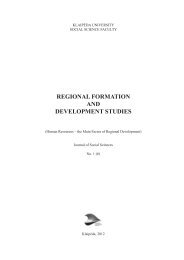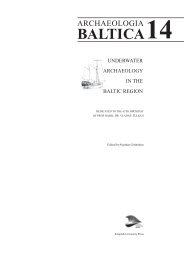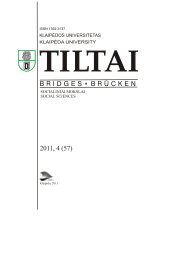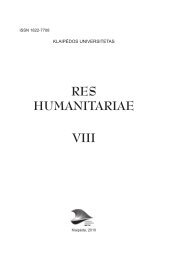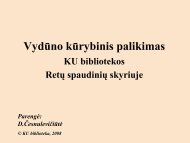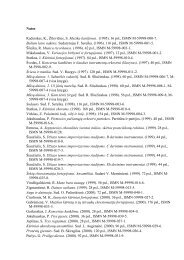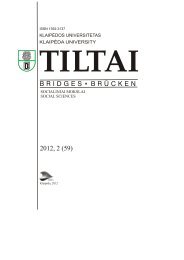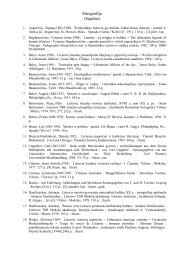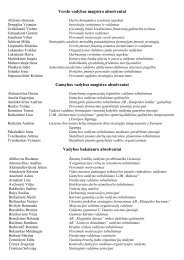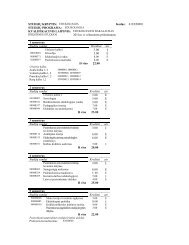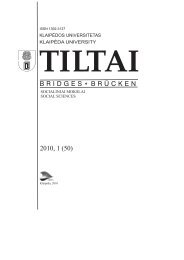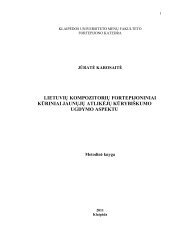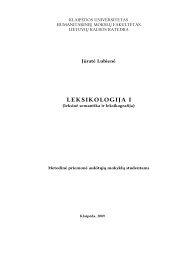2013,1 (62) - KlaipÄdos universitetas
2013,1 (62) - KlaipÄdos universitetas
2013,1 (62) - KlaipÄdos universitetas
You also want an ePaper? Increase the reach of your titles
YUMPU automatically turns print PDFs into web optimized ePapers that Google loves.
Trung Quang Dinh, Hilmar Þór Hilmarsson<br />
cially financial information, including audited annual reports. The readiness and well<br />
done “home-work” of Vietnamese buyers will help the process of ECAs in assessing<br />
their creditworthiness and making decision on their request quicker. Most of the Vietnamese<br />
fisheries processors now are working with local banks both state owned and<br />
privately, however, ECAs indicated that if foreign buyers work with international banks<br />
it will normally make the process faster because ECAs have more working experience<br />
with large international banks than local banks in a specific country.<br />
Conclusions<br />
When private sector companies engage in cross border trade and/or investment<br />
they are more likely to face higher risks than in domestic markets. These risks are noncommercial/political<br />
and commercial and the level of risk is different in different markets.<br />
In the context of emerging markets and due to the current uncertainty in financial<br />
market, these risks have moved towards to the top of corporate agendas. Certainly,<br />
these risks should be managed and appropriate risk mitigation sought.<br />
In order to cover the existing demand and to promote the export of its home products,<br />
ECAs worldwide provide various risk mitigation instruments. Through the research<br />
done by the authors and the real cases described in this article, we can see that<br />
there are real possibilities for companies to have risks covered thus enhance their business<br />
development especially when they tap into emerging markets. These instruments<br />
are even more important during times of crisis.<br />
Among the key factors to make things happen is the ability of ECAs to assess the<br />
creditworthiness of companies involved especially the foreign buyers. Therefore, in<br />
response to this issue, foreign buyers should provide full and transparent financial<br />
information to help the process move faster, including audited annual reports. Besides<br />
that, ECAs prefer working with international banks that they know and already have a<br />
business relationship with so it would be advantage for foreign buyers to seek loans<br />
from international banks such as: ANZ, HSBC, American Standard Chartered Bank or<br />
international organizations like the Asian Development Bank and the International<br />
Finance Corporation of the World Bank Group, etc. The products offered by ECAs<br />
show that the risks associated with non-commercial/political and commercial risks in<br />
emerging markets can be managed, and the cases discussed in this article are tangible<br />
evidence of recent success during a global economic and financial crisis.<br />
Received 2012 12 28<br />
Approved for publishing <strong>2013</strong> 03 05<br />
References<br />
EIU. (2007). EIU and the Colombia Program on International Investment 2007. World Investment Prospects to 2011:<br />
Foreign Direct Investment and the Challenge of Political Risk. London: Economist Intelligence Unit. Available at:<br />
http://graphics.eiu.com/upload/WIP_2007_WEB.pdf (Accessed on January 6, 2012).<br />
EKF. (2009a). Case: Olam Buys Danish Equipment with Long-term Loan. Available at: http://www.ekf.dk/en/How-itworks/cases/Pages/GEA-Process-Engineering.aspx<br />
(Accessed on November 14, 2011).<br />
24



